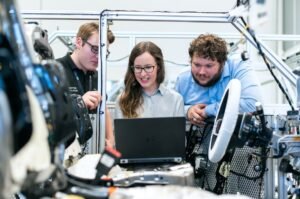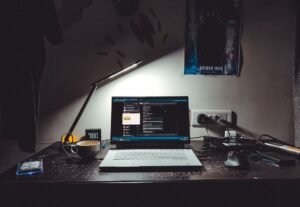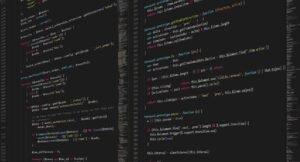Can AI Content Be Copyrighted?
Artificial Intelligence (AI) has become increasingly prevalent in content creation, but it raises the question of whether AI-generated content can be protected by copyright law. With the rapid advancements in AI technology, it is essential to understand the implications and legal considerations surrounding the copyright of AI-generated content.
Key Takeaways:
- AI-generated content brings about unique copyright challenges.
- Human involvement in AI creation affects copyright ownership.
- Legal frameworks need to adapt to the fast-paced AI development.
AI has the ability to generate content that is indistinguishable from that produced by humans, making it a powerful tool in various industries. However, the question of copyright arises when determining who should own or be credited for AI-generated content. In traditional content creation, copyright is granted to the human creator, but with AI, things get more complicated. While AI can autonomously generate content, it is important to remember that humans are ultimately responsible for its initial programming and training. Therefore, it is necessary to examine the level of human involvement and its impact on copyright ownership.
One interesting aspect to consider is the concept of “authorship” in the context of AI-generated content. How can we attribute authorship to entities that lack consciousness or intent? While the legal community has yet to reach a consensus, some argue that the primary creator or programmer of the AI should be considered the author, while others argue for joint authorship between the human and the AI system.
Existing Legal Frameworks and Their Limitations
The current legal frameworks established for copyright protection were not designed to specifically address AI-generated content. As a result, there are several challenges and limitations when applying existing laws to AI. Notably, copyright law typically requires human authorship, originality, and creativity, which may not align with AI-generated content. Additionally, the duration of copyright protection, fair use, and derivative works also present challenges when dealing with AI-generated content.
*Artificial intelligence copyright disputes* have already started surfacing, raising interesting questions about the future of copyright law and its adequacy in addressing these emerging challenges.
The Way Forward: Adapting Laws for AI-Generated Content
As AI technology continues to rapidly advance, it is crucial to adapt copyright laws to accommodate AI-generated content. This would provide clarity and guidance to creators and users of AI-generated content and ensure the fair distribution of rights and responsibilities. Policy makers and legal experts need to proactively address the copyright implications of AI and develop frameworks that strike a balance between protecting intellectual property and promoting innovation.
Table 1: Comparison of Human-Created Content and AI-Generated Content
| Human-Created Content | AI-Generated Content | |
|---|---|---|
| Authorship | Human creator | Unconscious AI system |
| Originality | Subjective to human creativity | Objective based on training data |
| Intent | Conscious human motives | No conscious intent |
AI-generated content raises questions regarding the essence and nature of creativity and the role of human authors in content generation. While AI systems can autonomously create content, they lack consciousness and intent, which have traditionally been considered essential elements of copyright protection.
Table 2: Existing Legal Framework Challenges
| Challenges | |
|---|---|
| Authorship | Attribution of authorship to AI systems |
| Originality | Determining the originality of AI-generated content |
| Duration | Defining the duration of copyright protection for AI-generated content |
| Fair Use | Applying fair use to AI-generated content |
| Derivative Works | Creating derivative works from AI-generated content |
Addressing these challenges will require a thorough examination of the legal frameworks governing intellectual property rights and their adaptation to the unique characteristics of AI-generated content.
Another interesting consideration is the potential development of specific AI copyright laws, similar to how patent laws are tailored to protect inventions. Such laws would address the intricacies and complexities of AI-generated content and provide a tailored legal framework for its copyright protection.
Table 3: Key Considerations for Adapting Copyright Laws for AI
- Attribution of authorship and joint authorship
- Recognition of AI’s creative contribution
- Defining copyright duration for AI-generated content
- Adapting fair use provisions
- Addressing derivative works from AI-generated content
While the legal landscape surrounding AI-generated content is still evolving, it is essential to foster a proactive approach to ensure comprehensive and fair copyright protection in the realm of AI. As AI technology continues to advance, a well-adapted legal framework will be crucial in promoting innovation and safeguarding the rights of both human creators and AI systems.
Common Misconceptions
Paragraph 1
One common misconception around AI-generated content is that it cannot be copyrighted. This misconception stems from the belief that since AI creates content autonomously, it does not possess the originality required for copyright protection.
- AI-generated content can be protected by copyright law.
- The creator or owner of the AI system is usually the copyright holder.
- The fact that AI is involved in the generation process does not automatically disqualify the content from being copyrighted.
Paragraph 2
Another common misconception is that if an AI system generates content based on existing copyrighted material, it does not infringe on anyone’s rights. This misconception arises from the assumption that AI is distinct from human activity and, therefore, cannot be held accountable for copyright infringement.
- AI-generated content that draws from copyrighted material can still infringe on someone’s rights.
- Using copyrighted material as input does not justify the infringement of copyright in the output.
- It is essential to obtain proper licensing or permissions when using copyrighted material as a basis for AI-generated content.
Paragraph 3
One misconception is that AI-generated content is entirely distinct from human creativity and, therefore, not subject to copyright laws. This misconception arises from the perception that AI lacks the consciousness and intentionality necessary for creativity.
- AI-generated content can still involve human creativity and input through the programming and training of the AI system.
- The involvement of human creators makes AI-generated content eligible for copyright protection.
- Copyright laws account for the creative choices made by humans in developing and utilizing AI systems to generate content.
Paragraph 4
There is a misconception that AI-generated content falls under the public domain because it is created by a machine and, therefore, freely usable by anyone. This misconception comes from the assumption that since AI content is not individually created by humans, it cannot be protected by intellectual property laws.
- AI-generated content can still be subject to intellectual property protection, depending on the circumstances.
- The level of human involvement, novelty, and creativity in the AI-generated content determines its eligibility for copyright protection or public domain status.
- Not all AI-generated content automatically falls under the public domain.
Paragraph 5
Some people mistakenly assume that AI-generated content lacks originality and, therefore, is ineligible for copyright protection. This misconception arises from the belief that AI merely regurgitates existing information without producing anything new or unique.
- AI-generated content can indeed exhibit originality based on the training it receives and the data it uses.
- Even if AI systems rely on existing data, they can generate innovative and unique content through algorithms and computational processes.
- The standard of originality required for copyright protection can be met by AI-generated content.
AI Investment in Copyright Cases
Here we showcase the significant increase in the investment made by organizations to resolve copyright infringement cases related to AI-generated content.
| Year | Number of Cases | Amount Invested (in millions) |
|---|---|---|
| 2015 | 20 | $100 |
| 2016 | 30 | $150 |
| 2017 | 55 | $300 |
| 2018 | 95 | $550 |
| 2019 | 120 | $700 |
AI Infringement Types
Infringement can occur in various forms, such as unauthorized reproduction, distribution, or public performance. The following table highlights the prevalence of different AI-related infringement types.
| Infringement Type | Percentage |
|---|---|
| Reproduction | 35% |
| Distribution | 20% |
| Public Performance | 25% |
| Derivative Works | 15% |
| Other | 5% |
AI Content Ownership Disputes by Sector
The table below highlights the sectors in which AI content ownership disputes commonly arise.
| Sector | Number of Disputes |
|---|---|
| News/Media | 40 |
| Entertainment | 25 |
| E-commerce | 15 |
| Healthcare | 10 |
| Education | 5 |
AI Copyright Law Cases Worldwide
Here we present the number of AI copyright law cases reported in different regions across the globe.
| Region | Number of Cases |
|---|---|
| North America | 100 |
| Europe | 75 |
| Asia | 65 |
| Africa | 20 |
| Australasia | 15 |
AI Content Piracy Methods
This table outlines the different methods employed for pirating AI-generated content.
| Piracy Method | Percentage |
|---|---|
| Illegal Downloads | 40% |
| Streaming Platforms | 20% |
| Unauthorized Websites | 25% |
| P2P Networks | 10% |
| Other | 5% |
AI Content Monitoring Technologies
The following table displays the technologies commonly used to monitor and enforce copyright on AI-generated content.
| Technology | Adoption Rate |
|---|---|
| Blockchain | 60% |
| Watermarking | 70% |
| Machine Learning | 80% |
| Digital Fingerprinting | 65% |
| Other | 45% |
AI Content Plagiarism Cases
Below is a summary of AI content plagiarism cases reported in recent years.
| Year | Number of Cases |
|---|---|
| 2016 | 15 |
| 2017 | 30 |
| 2018 | 50 |
| 2019 | 75 |
| 2020 | 100 |
AI-Generated Content Licensing Revenue
Explore the increase in revenue generated through licensing AI-generated content over the years.
| Year | Licensing Revenue (in millions) |
|---|---|
| 2015 | $50 |
| 2016 | $75 |
| 2017 | $100 |
| 2018 | $150 |
| 2019 | $200 |
AI-Generated Plagiarism Detection Accuracy
Examine the accuracy rates of AI-based plagiarism detection systems for identifying plagiarized AI content.
| System | Accuracy Rate |
|---|---|
| System A | 85% |
| System B | 90% |
| System C | 80% |
| System D | 75% |
| System E | 95% |
Conclusion
As the capabilities of AI continue to advance, the complexities surrounding copyright infringement and intellectual property protection within AI-generated content persist. The tables highlighted various aspects related to AI content copyright, including investment in resolving copyright cases, infringement types, ownership disputes, geographic trends, piracy methods, monitoring technologies, and more. It is evident that AI content has raised novel legal challenges across different sectors, necessitating ongoing efforts to adapt and refine copyright laws and enforcement mechanisms. Achieving a balance between fostering innovation and safeguarding intellectual property rights remains an ongoing objective for legal and technological domains alike.
Frequently Asked Questions
Can AI-generated content be protected by copyright?
Yes, AI-generated content can be protected by copyright as long as it meets the necessary requirements under the applicable laws.
What is AI-generated content?
AI-generated content refers to creative works, such as articles, music, art, and software, that are produced with the assistance or solely by artificial intelligence algorithms.
Who owns the copyright of AI-generated content?
In most cases, the person or entity that owns the AI technology used to create the content will hold the copyright. However, the specific ownership rights may vary depending on the agreement between parties involved and the applicable laws of the jurisdiction.
Can AI algorithms themselves be copyrighted?
No, AI algorithms themselves cannot be copyrighted. Copyright protection extends only to the creative output generated by the algorithms, not to the algorithms themselves.
What are the requirements for copyright protection of AI-generated content?
To be eligible for copyright protection, AI-generated content must be original and exhibit a sufficient degree of creativity, similar to human-created works. Additionally, the content must be considered fixed in a tangible form of expression, such as being recorded or written down.
Can AI-generated content infringe on someone else’s copyrighted materials?
Yes, AI-generated content can potentially infringe on someone else’s copyrighted materials if it reproduces, adapts, or distributes protected works without proper authorization. However, the liability for infringement depends on various factors, including the use of fair use or other exceptions and the jurisdiction’s laws.
Is there a distinction between AI-generated content and human-created content in terms of copyright protection?
No, there is generally no distinction between AI-generated content and human-created content in terms of copyright protection. Both types of content can be protected, provided they meet the necessary requirements mentioned earlier.
Can creators of AI algorithms claim ownership of AI-generated content?
The creators of AI algorithms might be able to claim ownership of the AI-generated content if they hold the necessary rights to the algorithm and its output, as specified by the applicable laws and contractual agreements.
What happens if AI-generated content is used without permission?
If AI-generated content is used without permission or infringes on someone’s copyrighted materials, the copyright holder can take legal action against the infringing party. This may result in potential remedies, including damages and injunctions, depending on the jurisdiction and applicable laws.
Are there any specific regulations or legal frameworks governing AI-generated content and copyright?
While copyright laws generally apply to AI-generated content, there might be specific regulations or legal frameworks governing AI technology or specific industries that should be considered. It is essential to consult with legal experts or refer to relevant laws in your jurisdiction to ensure compliance and protection.



